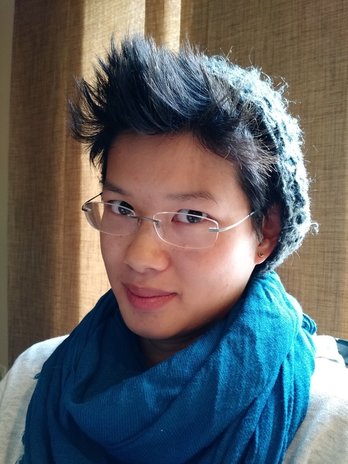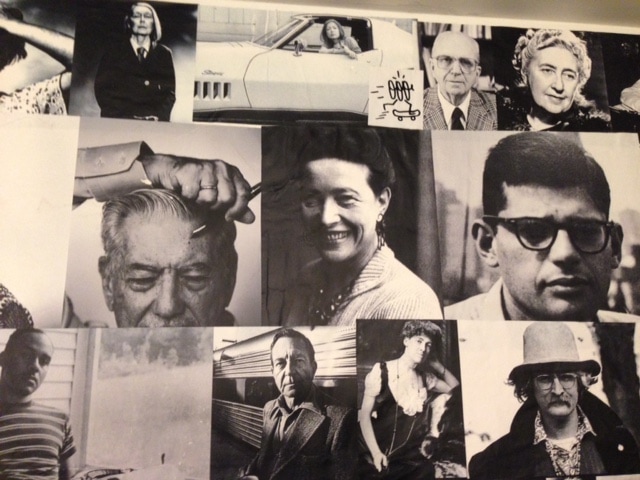|
What is Growing in These Woods Green in here, gleaming like being inside a fable but with stalls of fruit you can’t eat. To go home, leave crumbs. When the wood circles you back here instead, let the lost and the impossible ripen in you, ripen and go. Previously published in Painted Bride Quarterly. Nomi Stone’s second collection of poems, Kill Class is forthcoming from Tupelo Press in 2018. She is also the author of the poetry collection Stranger’s Notebook (TriQuarterly, 2008), a Postdoctoral Research Fellow in Anthropology at Princeton University, and an MFA Candidate in Poetry at Warren Wilson College. Poems appear or are forthcoming in The New Republic, The Best American Poetry 2016, Poetry Northwest, Sixth Finch, diode, and elsewhere. Kill Class is based on two years of fieldwork she conducted within war trainings in mock Middle Eastern villages erected by the US military across America. www.nomistone.net from You've Got A Pretty Hellmouth Maybe some sex at death lake to amplify the bright spots? And hey, nice mosquito skull sketch Way to keep the insides exposed and thanks for yelling “run” all the time * We all knew you’d be safer in the burning barn so you swamped that old Galaxie, fell into floorboard ferns and a hatchet, a peek-hole and a peekaboo choking scene * On one hand what’s left of my other hand, on my face your last useful teeth. We were just trying to relax at the cabin 45 acres of ancient evil and some antlers, so those misused farm tools are cursed now Welcome to the fam * You step into the flooded basement, wish for claws then gills, stumble out of the bushes into the ghost train’s path, open the cupboard door to some full on Bible sex, follow the goat farmer into the cave to count stars Previously published in Cloud Rodeo. Michael Sikkema is the author of four full length collections of poetry, most recently Die Die Dinosaur (BlazeVOX books) . He is also the author of several chapbooks and collaborative chapbooks. Unsolicited Advice To A Facebook Mom Stop plastering the site with photos of your strapping boy on the cliff of manhood, pitching a no-hitter, practicing guitar, don’t publicize his tuxedo’d beauty posing with his prom date, or family jaunts to look at colleges for the fall. Better to shield him from happenstance, mistaken identity, the evil eye; protect him from what you won’t imagine: a drive-by. a street race. an overdose. a dare. Pass an egg above his body while he’s sleeping. Make the mano fico over him with your fist. Sew small mirrors into his clothes to reflect misfortune. Tie a red string around his wildness. When someone gives him a compliment, spit over your shoulder three times. Then touch wood. Stop flaunting your boy’s shining face, his sweetness, how he still lets you kiss him goodnight. Listen to me: Like you, I was once besotted. Don’t tempt the gods. Previously published in Literary Mama. Alexis Rhone Fancher is the author of How I Lost My Virginity to Michael Cohen and other heart stab poems, (2014), State of Grace: The Joshua Elegies, (2015), and Enter Here (2017). She is published in The Best American Poetry 2016, Rattle, Slipstream, Hobart, Cleaver, The MacGuffin, and elsewhere. Her photographs are published worldwide. A multiple Pushcart Prize and Best of The Net nominee, Alexis is poetry editor of Cultural Weekly. Find her at: www.alexisrhonefancher.com A Goddess In Purple Rain Behind glass, a lady is lit-up inside the laundro-mat. She’s folding sheets, pink curlers of baroque in her hair, singing and creasing a t-shirt with sequins. Her arms and hips stretch out to a body of air—the room filling with sound. And I am humming inside her—inside her body, burning for shelter from the abyss of my alone. Rounding a corner in a car, I am passing by, hearing “Purple Rain” on the radio—I almost can taste the sweat on the brow of the boy I danced with so many years ago—It tasted like dry toast or the brunt of hurting. Listen to the sky imploring, Come as you are—Alone to the last concert, to light matches in a spell-bound crowd—Remorse of loving a rock star we can never own. And now the lady in the laundromat is swaying, and I am swaying with her from my car—Maybe she is dancing with her son, going off to boot camp, or the ends of the earth. I’m thinking of my son at three, standing on the kitchen table in a wet diaper, banging music from a wooden spoon. This is that concert, where you lit a match to your own bag of wounds. You felt like you belonged, a citizen. Alive as a hackle of girls at the May prom. Look at the moon, hanging like a shoe to throw its heel of light on the page or an empty field. We are all in the body of this night, cogent as a judge who loves the law. The lady in the laundromat carries the load to her car, unpins her hair. I don’t want to be alone tonight. The stars allow me to follow her— we are passing the town, rooftops are hunkering down to sing lullabies to the young, and the night is a stranger touching my sleeve. Previously published in Hermeneutic Chaos Journal. Cynthia Atkins is the author of Psyche’s Weathers and In The Event of Full Disclosure, and the forthcoming chapbook, Still-Life With God (Hermeneutic Chaos Press, 2018). Her work has appeared in numerous journals, including Alaska Quarterly Review, BOMB, Cleaver Magazine, Cultural Weekly, Del Sol Review, Florida Review, Green Mountains Review, Harpur Palate, Hermeneutic Chaos, Le Zaporogue, North American Review, Poetry Fix, Prairie Schooner, Seneca Review, Tampa Review, Tinderbox, Thrush, Valparaiso Review and Verse Daily. She is formerly the assistant director for the Poetry Society of America, and has taught English and Creative Writing, most recently at Blue Ridge Community College, where she curates a quarterly Reading Series, Lit-Salon. Atkins earned her MFA from Columbia University and has earned fellowships and prizes from Breadloaf Writers’ Conference, The Writer’s Voice, and Writers@Work. She lives on the Maury River of Rockbridge County, Virginia, with artist Phillip Welch and their family. More work and info at: www.cynthiaatkins.com At / Here New Year’s resolution – stop talking to yourself. * I have no promises to keep. So it seems, good sense only goes so far as genius allows. As one grows increasingly informed, the desire becomes to lose commonality and the sensibility which accompanies it. What good is a sense if it is only used for good? Give me a sense which brings a sensation – hand on stove, fall from heights. Excitement in known harm but unknown consequences doled out by nature. * What I wanted was not really to be alone but to be head over heels over someone. Someplace for emotions to go. I’m ambitious that way. * Who will concur while I wait? Without a fever for the infirmary. Without need for quarantine, who else will be here to hear? * I don’t like ‘cool.’ I don’t like ‘beautiful.’ I don’t like. I just don’t like. Let me love something indefinable for once. Let me hate. Leave me the freedom to go beyond dislike to the extremist position against certain notions. Let me have floors and ceilings in this room. Leave my food by the door. I’ll swallow it when it cools off a bit. * In solitude, I take even the public rather personally. Get offended or let joy arise from those passing by. * Consequences are irrelevant to cruelty. * Am I guilty of or for irony? What liberty, what power in producing, being, becoming another ending – only somewhat unexpected. Because, who doesn’t account for the curse of the paradox? * I am barbaric. Or I was. Or I want to be. Anyway, Barbary is close to me. * What forms of expression are at my disposal? Have I seemed happy for at least some of the time? Maybe in the end it will appear (to be) more apparent. * Somebody is talking about a fear of airplanes and I’m here thinking about a fear of talking to anyone or in particular – a someone across the room from here. Neither these nor those books are shields. And besides, a proper glance caught in spectacular timing cuts right through. Oh, but a look caught in flight can see a lot of turbulence. * Patience will always prove random is regular. Chaos dictates how the lines will shorten. No turns are being taken, orderly, while waiting. * Does one exist who is deserving as much of admiration as affection? I feel I’ve been born into a banned life. I think I understand now that there is no room in languages frequented or neglected for duality. For similarity to feel the same. This soul came passed down from those passed on with certain policies intact. Boycott the insincere. Embargo bad faith. Find distant compassion for those who are fake only because otherwise there would be no need to ever use words. There’d be no comprehension of a range of emotions. Nonetheless, I’ve given up on smiling. Previously published in eccolinguistics. Bio: Kenyatta JP Garcia is the author of Slow Living (West Vine Press), This Sentimental Education and Enter the After-Garde. Originally from Brooklyn, NY, Garcia now resides in Albany, NY where they received a degree in linguistics and spent a dozen years doing all the drudgery cooking requires. Now, loosened from the grease and sweat of the kitchen life, they edit Rigorous by day and spend their nights getting paid to put boxes one shelves. In the in between, they write short humor, poetry, diaries and work at being the best dreampunk one can dream up. Monkey Is Unrepentant And So Am I I am underneath the mountain with you, Sun Wukong. Buddha's ring finger on my chest, his thumb on yours. We can be proud together that the world was enough afraid of our noise that it put its giant palm over our mouths and froze that way. Previously published at Pittsburgh Poetry Review. Jasmine An is a queer, third generation Chinese-American who comes from the Midwest. Before graduating from Kalamazoo College in 2015, she also spent time in New York City and Chiang Mai, Thailand, studying poetry, urban development, and blacksmithing. Her chapbook, Naming the No-Name Woman, was published as the winner of the 2015 Two Sylvias Press Chapbook Prize. She has been awarded residencies at the Sundress Academy for the Arts and Hedgebrook. Her work can be found in HEArt, Stirring, Menacing Hedge, Pittsburgh Poetry Review and Southern Humanities Review, among others. Currently, she lives in Chiang Mai continuing her study of the Thai language and urban resilience to climate change. PREDATOR SATIATION
The cicada, little clock of self-sacrifice, true bug of Jesus, emerges in multitudes to the waiting mouths of predators so that a few might survive to procreate. And while I, too, have heard my biological timepiece ticking, shaved and spread my legs for it, fragrant and freshly vaccinated, my heart would beat as neither mother nor martyr. Woman is man’s most successful domesticated animal. I am no exception, childless or child-free. There’s no escape until, of course, there is-- but not as the machines we were. Our wristwatches seize the spike tooth every sixty seconds, the gold eyelid closes slowly, blades of sun blaring off the lake at solstice. Previously published in Southern Indiana Review Kathy Fagan’s fifth collection of poems is Sycamore (Milkweed Editions, 2017). Her first collection, The Raft, won the National Poetry Series; her second, MOVING & ST RAGE, won the Vassar Miller Poetry Prize. She is the recipient of fellowships from the NEA, the Ingram Merrill Foundation, and the Ohio Arts Council. Her work is widely anthologized, and recent work appears in Poetry, The Kenyon Review, The New Republic, and Narrative. Fagan directs the Creative Writing Program at The Ohio State University and serves as Series Editor of the OSU Press/The Journal Wheeler Poetry Prize. http://kathyfagan.net Begin Someone dreams of fire in a field In a cold house, in the winter, your head is on the table, your mind, busily constructing a machine Something taps at the door, calls you out from the deep reverie of making and unmaking The wood is dark and full of veins lost in its haze, you glimpse a shape through the thick trees of night And hear the distant sound of an engine moving, its pistons and gears, heavy with shudders and sighs How it seems that you’ve always heard it coming, long before it appears, the embodied will of the earth set to flame, a metaled desire The semblance of an unknown name you’ve carried home with you, unwittingly— all night, your body singing In the hallway mirror, something stirs in the corner of your eye and you cannot say what it is Only that it grows like a wildfire in a storm, that it tastes of steam That you would lay every number in the world on end and still, it would not be enough-- the heavens opening wide their spiraling arms And the dark heart within yearning to pull everything back while you stand on the threshold, believing. Previously published in Babbage's Dream (Sundress Publications, 2017). Note: to view this poem as intended, it's best to use a non-mobile device with Chrome. Neil Aitken is the author of Babbage’s Dream (Sundress Publications, 2017) and The Lost Country of Sight (Anhinga Press, 2008), which received the Philip Levine Prize, as well as the poetry chapbook, Leviathan (Hyacinth Girl Press, 2016). A former computer games programmer and a past Kundiman Fellow, he holds an MFA in Creative Writing from the University of California, Riverside and a PhD in Literature and Creative Writing from the University of Southern California. He is the founding editor of Boxcar Poetry Review, curator of Have Book Will Travel, and editorial board member of Poetry East West. www.neil-aitken.com Other projects: www.boxcarpoetry.com | www.thelitfantastic.com | www.havebookwilltravel.com Early Floral Easy to warn the girl in the slasher pic with a hiss and a shudder. Easy to sentence her to death, dismemberment at Bible camp, where you go to ride bareback and braid doormats from bread bags. Your counselor is tall, blonde Sally, and tan. Later, at dance camp, you flail on your toes. At cheerleading camp, you wear a short skirt that sways when you walk, as if someone’s watching. Someone is always watching a girl. Listen carefully to the voice in the movie. The girl in the movie made unfortunate choices, which you never do. She’s nothing like you. And now she’s nothing, blank bed in your cabin, where you rest after Crafts while you count down to Pool. She’s so gone it’s wholesome: purse on a hook, copper penny missing where good luck lurks. Previously Published in Gone Lawn Carol Guess is the author of numerous books of poetry and prose. A frequent collaborator, she teaches in the MFA program at Western Washington University. www.carolguessbooks.com www.carolguess.blogspot.com As a former editor of a small journal, I miss that feeling of pulling out the letter opener (yes, this dates me) and finding that one story, poem that I know I have to see into print. Though my time and resources are too finite to edit, I have decided that there is no better moment than Poetry Month to breathe a little life into this blog, while showcasing the work of my fellow poets.
Starting tomorrow and going through May 1st (I snoozed on April Fools' and I don't want to rob anyone of whoever the 30th poet will be…), you'll see one previously published piece featured here daily. The contributors range from authors of 16 books (!) to those whose first collections have just been released to those whose work is still emerging. My hopes? To give a small nod to many fine poets and their pieces that, though previously published, to my knowledge don't come with an expiration date. To give you a series of lines that keep you throughout your day, To celebrate these very alive and lively writers, as we tour their work in appreciation of the necessity of poetry. Especially now, in 2017. |
Blog HostNatasha Kochicheril Moni is a writer and a licensed naturopath in WA State. Enjoying this blog? Feel free to put a little coffee in Natasha's cup, right here. Archives
October 2019
Categories |










 RSS Feed
RSS Feed